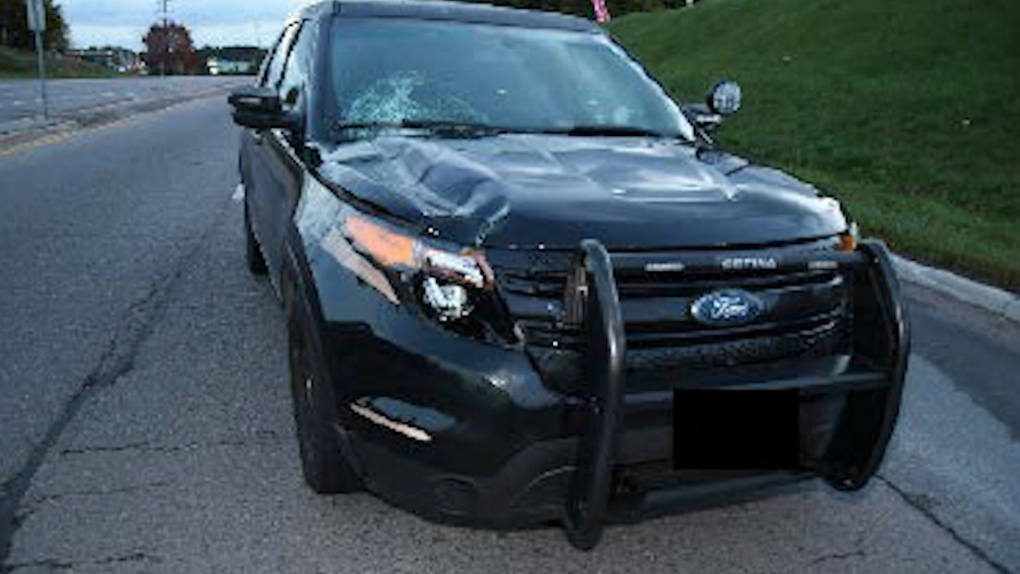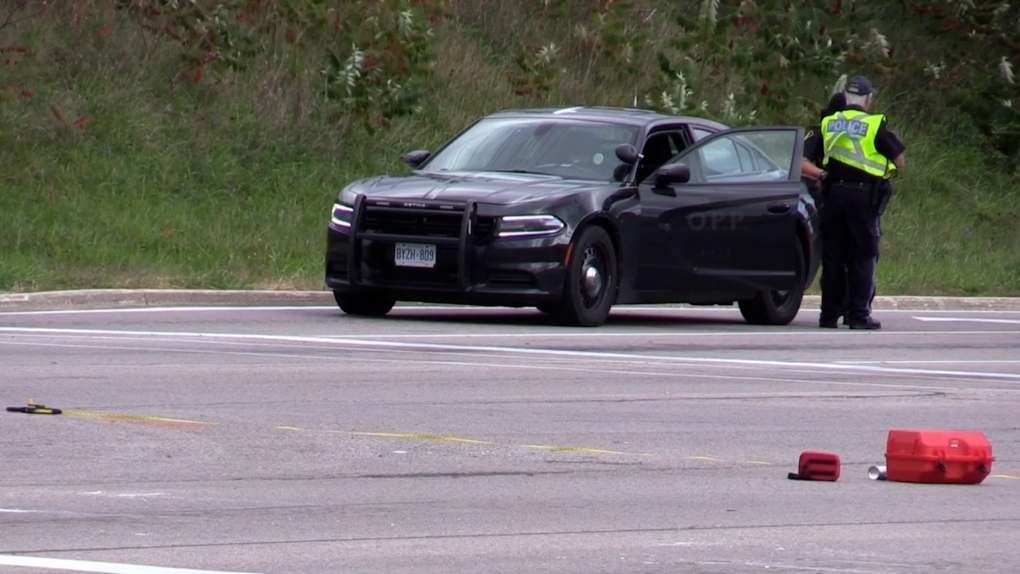Widow whose husband was killed by speeding Ontario police officer told misconduct was 'not serious'
A grieving widow whose husband was run over and killed by a speeding Ontario Provincial Police officer can’t believe the force told her it won’t hold a public hearing into the case because it decided the misconduct was "not serious."
Courtney D’Arthenay said she was shocked to read those words in a letter from OPP brass — a decision that narrows potential penalties for the officer involved and leaves her wondering if she will ever get answers to her many outstanding questions in the case.
“My entire life is completely altered in a way I could never imagine. I can’t go back to what it was. It’s the most serious thing when you don’t have a life partner any more,” D’Arthenay said in an interview.
In response to questions from CTV News Toronto, an OPP spokesperson agreed the tone of the response was "cold" — but stood by the decision to resolve the complaint informally.
“The OPP fully acknowledges that the terminology in the response letter…seems cold, considering the incident resulted in a tragic death. Unfortunately, that is the only wording available in the Police Services Act to describe conduct that can be resolved informally,” said spokesperson Bill Dickson.
- Download our app to get local alerts on your device
- Get the latest local updates right to your inbox
D’Arthenay, who is 37, said she knew after a short time that she and her husband Tyler Dorzyk were soulmates. They lived together in Pembroke, Ont. and Dorzyk, a marine technician by trade, loved mud running and pursuing creative projects.
Around midnight on September 29, 2020, Dorzyk, 35, was run over and killed in Midland, north of Barrie. He was travelling to the city for work and he and a friend were walking across Highway 12 at Jones Road in the rain.
An investigation found Const. Jaimee McBain was driving an unmarked SUV at the time, returning from getting coffee for another officer at a crime scene. She told investigators she didn’t see Dorzyk. She turned the vehicle around and tried to revive him.
The Special Investigations Unit found no reason to charge her criminally, and the OPP didn’t press Highway Traffic Act charges. A photo from the SIU investigation shows a smashed windshield on the passenger's side of the unmarked black SUV.
 An OPP cruiser involved in a fatal collision with a pedestrian on Sept. 29, 2020.
An OPP cruiser involved in a fatal collision with a pedestrian on Sept. 29, 2020.
Another watchdog, the Office of the Independent Police Review Director (OIPRD), did find McBain committed discreditable conduct. The vehicle’s GPS showed she was speeding between 72 km/h and 97 km/h, even though the limit at that intersection was 60 km/h.
The OIPRD found in the report that McBain didn’t follow the OPP’s own procedures.
“By speeding, she did not demonstrate legal, safe and appropriate driving practices to the general public.”
It also substantiated misconduct against an attending office, Sgt. Amy Thompson, who made comments blaming Dorzyk for his own death. Several other misconduct allegations were found to be unsubstantiated.
In its letter to D’Arthenay, the OIPRD said the matter could proceed to a hearing that could levy penalties up to dismissing McBain, unless both D’Arthenay and the OPP agreed to resolve it informally.
 Officers investigate after a pedestrian was fatally struck by an OPP cruiser in 2020.
Officers investigate after a pedestrian was fatally struck by an OPP cruiser in 2020.
But the OPP took the complaint in another direction, which didn’t require D’Arthenay’s consent: it opted to declare the misconduct in the case “not serious”, which by law allows the force to resolve the misconduct informally without a hearing, with lower penalties.
“After careful consideration… it is my decision the misconduct was not of a serious nature and this matter can be addressed informally without holding a hearing,” wrote Supt. Tracy Dobbin of the OPP’s Office of Professionalism, Respect, Inclusion and Leadership.
“This does not in any way minimize the issue you have brought to our attention, but I feel this conduct can be managed without the necessity of holding a formal disciplinary hearing,” Supt. Dobbin wrote. She said disciplinary measures could include counselling, reprimand, loss of pay or a combination.
Lawyer David Shellnutt, who deals with many OIPRD complaints in his practice, said the response doesn’t make sense.
“This is a serious case. A man died,” Shellnutt said in an interview, pointing out that the structure of the legal process allows the OPP to proceed informally even after a substantiated misconduct and without the consent of the complainant.
“This is the police policing themselves. They are ultimately in charge of the whole process,” he said.
Jess Spieker of Family and Friends for Safe Streets, said the act of minimizing the seriousness of the officer’s actions — which she said happens too often in traffic fatalities — can often retraumatize someone who is already suffering from the loss of a loved one.
“You would hope that the police would take this seriously enough to hold the officer accountable. But they’ve used the lack of seriousness, which society treats pedestrian deaths, to excuse the officer of significant wrongdoing. That’s morally reprehensible. I think normal person would hear this story and be appalled,” Spieker said.
Spieker called for a change to the road design to make it less likely anyone would speed at that spot, and called for changes to the Highway Traffic Act that would impose significant penalties for driving offences that result in death.
“It would get across the gravity and the extraordinary seriousness of killing a human being with your vehicle,” she said.
The letter from the OIPRD does say the OPP must notify the agency of what the punishment is. But it doesn’t guarantee that D’Arthenay will be told.
CTV News asked the OIPRD if their regular policy was to inform complainants of the outcome of discipline, and was told they could not comment thanks to a section in the Police Services Act — but couldn’t point to the section of the Act that would apply and refused to engage further.
McBain did not respond to messages from CTV News.
 Tyler Dorzyk and Courtney D’Arthenay are seen in this undated photograph.
Tyler Dorzyk and Courtney D’Arthenay are seen in this undated photograph.
D’Arthenay said she is left imagining what a hearing that might bring some justice for her husband would be like — and hoping that even without the hearing, she could tell McBain directly that the consequences of this crash are incredibly serious.
“I would tell her I’m sure she didn’t intend to do this. I don’t think any person goes out and says I’m going to run over a pedestrian today,” D’Arthenay said.
“But the choice she made, to be speeding as a professional driver, she fundamentally didn’t uphold what we count on her to do as a community. And the ramifications of her choices are irreparable. Not just to myself, but to Tyler’s family, the ripple effects, and I would hope I would give somehow her some sense of the consequences of her choices,” she said.
CTVNews.ca Top Stories

BREAKING Real GDP per capita declines for 6th consecutive quarter, household savings rise
Statistics Canada says the economy grew at an annualized pace of one per cent during the third quarter, in line with economists' expectations.
W5 Investigates A 'ticking time bomb': Inside Syria's toughest prison holding accused high-ranking ISIS members
In the last of a three-part investigation, W5's Avery Haines was given rare access to a Syrian prison, where thousands of accused high-ranking ISIS members are being held.
Class-action lawsuit on 'opioid-related wrongs': Court to rule on drug companies' appeal
Canada's top court will rule Friday on the appeal of a class-action lawsuit meant to recoup some of the costs associated with British Columbia's opioid crisis from major drug makers and distributors.
As Australia bans social media for children, Quebec is paying close attention
As Australia moves to ban social media for children under 16, Quebec is debating whether to follow suit.
Irregular sleep patterns may raise risk of heart attack and stroke, study suggests
Sleeping and waking up at different times is associated with an increased risk of heart attack and stroke, even for people who get the recommended amount of sleep, according to new research.
California man who went missing for 25 years found after sister sees his picture in the news
It’s a Thanksgiving miracle for one California family after a man who went missing in 1999 was found 25 years later when his sister saw a photo of him in an online article, authorities said.
Trudeau Liberals' two-month GST holiday bill passes the House, off to the Senate
The federal government's five-page piece of legislation to enact Prime Minister Justin Trudeau's promised two-month tax break on a range of consumer goods over the holidays passed in the House of Commons late Thursday.
Nick Cannon says he's seeking help for narcissistic personality disorder
Nick Cannon has spoken out about his recent diagnosis of narcissistic personality disorder, saying 'I need help.'
Notre Dame Cathedral: Sneak peek ahead of the reopening
After more than five years of frenetic reconstruction work, Notre Dame Cathedral showed its new self to the world Friday, with rebuilt soaring ceilings and creamy good-as-new stonework erasing somber memories of its devastating fire in 2019.

































